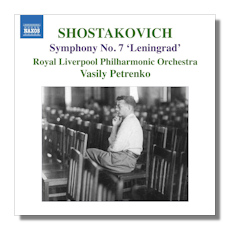
The Internet's Premier Classical Music Source
Related Links
- Shostakovich Reviews
- Latest Reviews
- More Reviews
-
By Composer
-
Collections
DVD & Blu-ray
Books
Concert Reviews
Articles/Interviews
Software
Audio
Search Amazon
Recommended Links
Site News
 CD Review
CD Review
Dmitri Shostakovich

Symphony #7 "Leningrad", Op. 60
Royal Liverpool Philharmonic Orchestra/Vasily Petrenko
Naxos 8.573057 79m
Vasily Petrenko continues his cycle of the Shostakovich symphonies with this stellar entry of the controversial Seventh. The first movement reading is maybe the finest I've ever encountered on recording. Petrenko delivers an excellent rendition of the invasion theme and its Bolero -like buildup. This theme represents either the Nazi invasion of the Soviet Union or Stalin's cruel oppression of the Soviet people, depending on whether you see Shostakovich as a mostly loyal composer of the motherland or as the closet dissident depicted by Solomon Volkov and others. Actually, I don't see why the theme can't signify both points of view at once: it was composed to represent the banality of evil and to that end it succeeds. The tune is rather simple, crass and garish, but also undeniably catchy too. The problem with it is that its ultimate effectiveness depends on its extra-musical associations, and thus if the music is new to you or you're unfamiliar with its programmatic aspects, you're likely to view the first movement as rather light and bombastic, hardly a work about anything truly serious.
In any event, however you view this movement and the rest of the work for that matter, you can hardly deny that this performance is about as effective a rendering of the music as you could want. It is also one of the slowest accounts of the symphony. Clocking in at 79:15, it eclipses even the expansive version by Gergiev (78:45), and nearly reaches to the 79:25 taken by Haitink. Typically the work has a duration of about 70 to 72 minutes. But Petrenko never sounds slow here as he imparts a sense of tension throughout the piece and deftly phrases the music to effectively capture the dark moods as well as the ultimate hope that comes at the end.
Petrenko's first movement is packed with detail and features spirited playing by the Royal Liverpool Philharmonic Orchestra, especially during the invasion theme. The second movement begins peacefully and seems like a respite from the violence of the opening panel, but Petrenko subtly points up the darker elements in the latter half. In the third movement he nicely contrasts the quieter music from the chorale theme and string cantilena with the violent and agitated music of the middle section. The finale is perhaps the hardest movement for a conductor to bring off effectively, as its mood swings are numerous but also quite gradual: it begins in agitated quiet, then turns to anxious restlessness, and then to boisterous anger. It doesn't stop there as the music becomes solemn and mournful and settles in a sort of murky swamp in which it seems mired irretrievably. Petrenko conveys these dark moods with utter conviction and then slowly, subtly rouses the orchestra to convert the darkness to hope as the epic main theme from the first movement returns to herald defiant triumph.
The sound reproduction is vivid and powerful – about as good as anything on CD today, and the album notes by Richard Whitehouse are thorough and illuminating. While there have been a fair number of fine recordings of this symphony by Svetlanov, Haitink, Barshai, and others, this one by Petrenko is as good a version as I've ever encountered.
Copyright © 2013, Robert Cummings





















